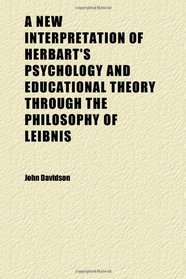Search -
A New Interpretation of Herbart's Psychology and Educational Theory Through the Philosophy of Leibnis
A New Interpretation of Herbart's Psychology and Educational Theory Through the Philosophy of Leibnis
Author:
General Books publication date: 2009 Original publication date: 1906 Original Publisher: W. Blackwood and sons Subjects: Educational psychology Education / Educational Psychology Notes: This is a black and white OCR reprint of the original. It has no illustrations and there may be typos or missing text. When you buy the General Books edi... more »
Author:
General Books publication date: 2009 Original publication date: 1906 Original Publisher: W. Blackwood and sons Subjects: Educational psychology Education / Educational Psychology Notes: This is a black and white OCR reprint of the original. It has no illustrations and there may be typos or missing text. When you buy the General Books edi... more »
ISBN-13: 9781150057908
ISBN-10: 1150057904
Publication Date: 12/18/2009
Pages: 114
Rating: ?
ISBN-10: 1150057904
Publication Date: 12/18/2009
Pages: 114
Rating: ?
0 stars, based on 0 rating




